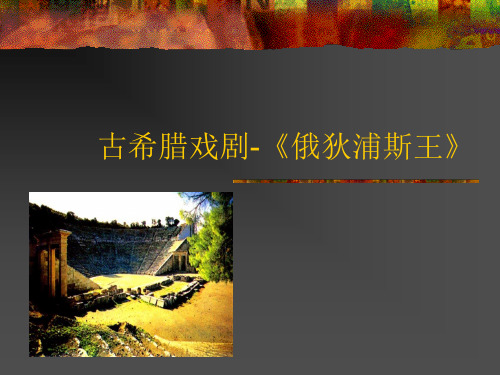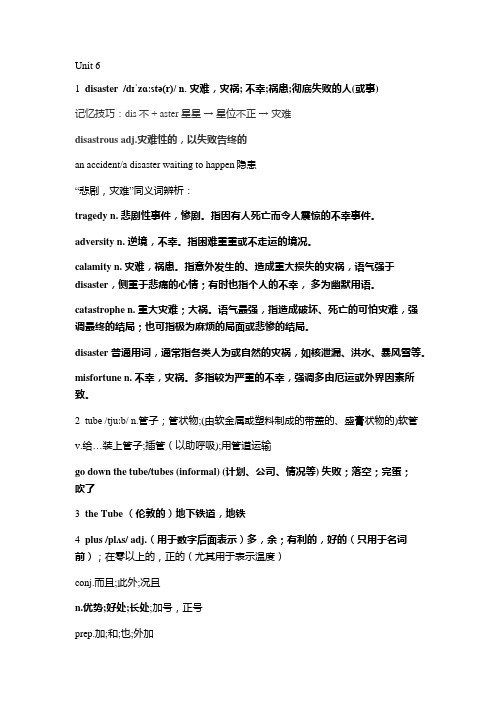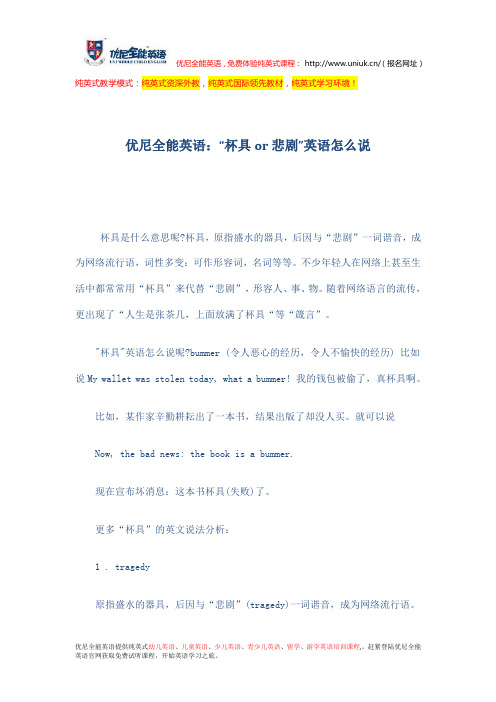Tragedy 悲剧——英文定义
- 格式:doc
- 大小:20.50 KB
- 文档页数:1


人生悲剧英文作文英文:Tragedy is a part of life, and unfortunately, I have experienced my fair share of it. From losing loved ones to facing personal struggles, I have come to understand that life can be cruel and unpredictable.One of the most significant tragedies in my life was losing my father at a young age. It was a devastating blow that left me feeling lost and alone. I struggled to come to terms with his death and often found myself feeling angry and resentful towards the world.Another tragedy I faced was a personal struggle with mental health. I battled with depression and anxiety for years, which made it difficult for me to function in my daily life. It was a constant battle that left me feeling exhausted and defeated.Despite these tragedies, I have learned to findstrength in my struggles. I have found comfort in the support of my loved ones and have sought out professional help to overcome my mental health struggles. Through it all, I have come to realize that life is not always fair, but it is up to us to find the courage to keep moving forward.中文:悲剧是生命中不可避免的一部分,不幸的是,我经历了很多。

Unit 61 disaster /dɪˈzɑːstə(r)/ n. 灾难,灾祸; 不幸;祸患;彻底失败的人(或事)记忆技巧:dis 不 + aster 星星→ 星位不正→ 灾难disastrous adj.灾难性的,以失败告终的an accident/a disaster waiting to happen隐患“悲剧,灾难”同义词辨析:tragedy n. 悲剧性事件,惨剧。
指因有人死亡而令人震惊的不幸事件。
adversity n. 逆境,不幸。
指困难重重或不走运的境况。
calamity n. 灾难,祸患。
指意外发生的、造成重大损失的灾祸,语气强于disaster,侧重于悲痛的心情;有时也指个人的不幸,多为幽默用语。
catastrophe n. 重大灾难;大祸。
语气最强,指造成破坏、死亡的可怕灾难,强调最终的结局;也可指极为麻烦的局面或悲惨的结局。
disaster 普通用词,通常指各类人为或自然的灾祸,如核泄漏、洪水、暴风雪等。
misfortune n. 不幸,灾祸。
多指较为严重的不幸,强调多由厄运或外界因素所致。
2 tube /tjuːb/ n.管子;管状物;(由软金属或塑料制成的带盖的、盛膏状物的)软管v.给…装上管子;插管(以助呼吸);用管道运输go down the tube/tubes (informal) (计划、公司、情况等) 失败;落空;完蛋;吹了3 the Tube (伦敦的)地下铁道,地铁4 plus /plʌs/ adj.(用于数字后面表示)多,余;有利的,好的(只用于名词前);在零以上的,正的(尤其用于表示温度)conj.而且;此外;况且n.优势;好处;长处;加号,正号prep.加;和;也;外加plus or minus左右,大约5 erupt /ɪˈrʌpt/ v.(火山)爆发,喷发;(搏斗、暴力事件、噪音等)突然发生,爆发;(情绪)迸发;突然出现,冒出记忆技巧:e 出 + rupt 破,断裂→ 破裂而喷出→ 爆发eruption n.长(萌)出,爆(喷)发,喷溢,发疹eruptive adj.暴发的;喷出的;疹的“喷发”同义词辨析:erupt 多指火山等喷发,也指暴力事件等突然发生。

黑格尔名言英文黑格尔是德国哲学家,他的学说在后代很长时间内一直引起争论,他对思想界有广泛的影响,几乎任何学派都对他的学说给予肯定或提出批判。
下是小编整理的黑格尔英文名言,你从中能否看出什么哲理呢?1、owl bird of wisdom, in the twilight of civilization began to take off。
智慧之鸟的猫头鹰,在文明的暮色中才开始起飞。
2、a nation there is a group of people looking at the stars,they have hope。
一个民族有一群仰望星空的人,他们才有希望。
3、if the music is flowing architecture,that building is frozen music。
如果说音乐是流动的建筑,那建筑物则是凝固的音乐。
4、humans learned a lesson from history, it is not learned any lessons。
人类从历史里学到一个教训,那就是没有学到任何教训。
5、we have learned lessons from history is that, not to have learned from history。
我们从历史中学到的教训就是,没从历史中学到教训。
6、numbness and apathy of the people, is the most solid mass foundation autocracy。
麻木而冷漠的民众,是专制政体最稳固的群众基础。
7、only when something of value to make the purpose of their lives have value。
只有在以某种有价值的东西做目的时,性命才有价值。
8、hey,buddy,i said,hey,man i said,there is no sense of how that may exist。

伟大的悲剧英文讲解A great tragedy is a literary genre in which the protagonist, usually a noble or influential character, experiences a downfall due to a fatal flaw or external circumstances. This genre explores deep human emotions, the consequences of actions, and the fragility of life.The tragic hero is often portrayed as a person gifted with extraordinary abilities, such as intelligence or courage, but possesses a hamartia or tragic flaw. This flaw ultimately leads to their downfall and is often a result of their excessive pride, ambition, or lack of self-awareness. The audience sympathizes with the tragic hero as they witness their inevitable downfall, highlighting the tragic aspect of the story.The plot of a great tragedy follows a structure known as the "tragic arc." It begins with an exposition, where the audience is introduced to the protagonist and their situation. A series of events unfolds, leading to a climax, where the tragic flaw is fully revealed and the protagonist faces their ultimate downfall. The tragic hero often recognizes their mistake but is unable to change their fate, evoking a sense of pity and fear in the audience.One of the most famous examples of a great tragedy is William Shakespeare's play, "Hamlet." The protagonist, Prince Hamlet, undergoes a series of tragic events triggered by his father's death and his mother's hasty remarriage. Hamlet's tragic flaw is his indecisiveness, as he struggles with takingaction against his uncle, who is responsible for his father's murder. This flaw leads to his downfall and the deaths of many characters, ultimately culminating in a tragic ending.In conclusion, a great tragedy is a genre that explores the downfall of a noble character due to their fatal flaw or external circumstances. It delves into deep human emotions, the consequences of actions, and the fragility of life. Through the tragic hero's journey, the audience is left with a sense of pity and fear, reflecting on the complexities of human existence.。

纯英式教学模式:纯英式资深外教,纯英式国际领先教材,纯英式学习环境!
优尼全能英语:“杯具or悲剧”英语怎么说
杯具是什么意思呢?杯具,原指盛水的器具,后因与“悲剧”一词谐音,成为网络流行语,词性多变:可作形容词,名词等等。
不少年轻人在网络上甚至生活中都常常用“杯具”来代替“悲剧”,形容人、事、物。
随着网络语言的流传,更出现了“人生是张茶几,上面放满了杯具“等“箴言”。
"杯具"英语怎么说呢?bummer (令人恶心的经历,令人不愉快的经历) 比如说My wallet was stolen today, what a bummer! 我的钱包被偷了,真杯具啊。
比如,某作家辛勤耕耘出了一本书,结果出版了却没人买。
就可以说
Now, the bad news: the book is a bummer.
现在宣布坏消息:这本书杯具(失败)了。
更多“杯具”的英文说法分析:
1 . tragedy
原指盛水的器具,后因与“悲剧”(tragedy)一词谐音,成为网络流行语。
2. cothurnus
coterminous 相连的...cothurnus 悲剧...cotidal line 同潮线
3. cothurnus, tragedy
comedy of situation, situation comedy 情节喜剧?...cothurnus, tragedy 悲剧?...highcomedy 主题严厉、含义深长的喜剧?
4. buskin
busker 卖艺人...buskin 悲剧...buskined 穿半统靴的。
公共地悲剧“公地悲剧”(Tragedy of the commons)是一种涉及个人利益与公共利益(Common good)对资源分配有所冲突的社会陷阱(Social trap)。
这个字起源于威廉·佛司特·洛伊(William Forster Lloyd)在1833年讨论人口的著作中所使用的比喻。
1968年时,加勒特·哈丁(Garret Hardin)在期刊《科学》将这个概念加以发表、延伸,称为〈公地悲剧〉(The Tragedy of the Commons)。
而这个理论本身就如亚里斯多德所言:“那由最大人数所共享的事物,却只得到最少的照顾”。
牧民与草地的故事有一个关于牧民与草地的故事,说的是当草地向牧民完全开放时,每一个牧民都想多养一头牛,因为多养一头牛增加的收益大于其购养成本,是有利润的。
尽管因为平均草量下降,增加一头牛可能使整个草地的牛的单位收益下降。
但对于单个牧民来说,他增加一头牛是有利的。
可是如果所有的牧民都看到这一点,都增加一头牛,那么草地将被过度放牧,从而不能满足牛的需要,导致所有牧民的牛都饿死。
这个故事就是公共资源的悲剧。
哈定说:“在共享公有物的社会中,每个人,也就是所有人都追求各自的最大利益。
这就是悲剧的所在。
每个人都被锁定在一个迫使他在有限范围内无节制地增加牲畜的制度中。
毁灭是所有人都奔向的目的地。
因为在信奉公有物自由的社会当中,每个人均追求自己的最大利益。
公有物自由给所有人带来了毁灭。
”公共地悲剧非正常的管理方法从这样的观点出发,哈丁转向寻求非科技或非资源管理的方法。
正面:牧羊人可以从增加的羊只上获得所有的利益负面:牧场的承载力因为额外增加的羊只有所耗损然而,牧场理论的关键性在于这两者的代价并非平等:牧羊人获得所有的利益,但是资源的亏损却是转嫁到所有牧羊人的身上。
因此,就理性观点考量,每一位牧羊人势必会衡量如此的效用,进而增加一头头的羊只。
但是当所有的牧羊人皆做出如此的结论,并且无限制的放牧时,牧场负载力的耗损将是必然的后果。
描写悲剧的英文作文英文:Tragedy is a genre that has been explored in literature, theater, and film for centuries. It is a story that often involves a protagonist who experiences a downfall due to their own flaws or circumstances beyond their control. Tragedies evoke strong emotions in the audience, often leaving them feeling sorrowful and empathetic towards the characters.One of the most famous tragedies in literature is Shakespeare's "Romeo and Juliet." The story revolves around two young lovers from rival families who are unable to be together due to the feud between their families. Ultimately, their love ends in tragedy as they both take their own lives.Another example of tragedy is the Greek myth of Oedipus. Oedipus unknowingly kills his father and marries his mother,fulfilling a prophecy that was foretold to him. When he discovers the truth, he blinds himself and is exiled from his kingdom.Tragedies often explore themes such as fate, love, and the human condition. They remind us that life is unpredictable and that even the most well-intentioned actions can lead to disastrous consequences.中文:悲剧是一个在文学、戏剧和电影中被探索了几个世纪的流派。
《高级英语》课文逐句翻译(17)Lesson Four The Tragedy(悲劇) of Old Age in AmericaBy Robert N. ButlerText美国老年的悲剧What is it like to be old in the United States ?在美国,老年是个什么样子?What will our own lives be like when we are old ?当我们自己老了以后,生活会是什么样子?Americans find it difficult to think about old age until they are propelled into the midst of it by their own aging and that of relatives and friends .美国人感到在他们置身于自己的老年或亲朋好友的老年之中以前要考虑老年时的状况是很困难的。
Aging is the neglected stepchild of the human life cycle .衰老过程是人类生命周期中被忽视的非亲生儿。
Though we have begun to examine the socially taboo(忌諱) subjects of dying and death , we have leaped over that that long period of time preceding death , we have leaped over that long period of time preceding death known as old age .虽然我们已开始研究有关临终和死亡这个为社会所忌讳的题目,但是我们却跳过了死亡来临之前、称为老年的那一段漫长的时间。
In truth , it is easier to manage the problem of death than the problem of living as an old person .其实对待死亡的问题比对待老年时生活的问题要更容易Death is a dramatic one-time crisis while old age is a day-by –day and year –by –year confrontation with (對抗)powerful external and internal forces , a bittersweet coming to terms with one’s own personality and one’s life .。
汉译《诗学》悲剧定义之比较研究所属栏目> 净化作者:田兆耀发布时间:2005-4-13 12:27:30 点击数:4342[发表评论] [关闭窗口]摘要:汉译《诗学》对悲剧定义的关键术语翻译存在分歧。
这涉及到对亚里士多德美学体系和古希腊悲剧特质的理解。
古希腊悲剧的特质重在“严肃”,悲剧的“卡塔西斯”作用是从医学上引申出来的。
“卡塔西斯”作用主要是针对怜悯和恐惧而不是其它情感。
关键词:《诗学》;严肃;卡塔西斯;怜悯与恐惧亚里士多德的《诗学》历来是一个学术竞技场。
现存《诗学》分5部分,共26章,主要讨论悲剧,第6章中给悲剧下了一个经典的定义,下面给出传布较广的四种中译文。
罗念生译文为:悲剧是对于一个严肃、完整、有一定长度的行动的摹仿;它的媒介是语言,具有各种悦耳之音,分别在剧的各部分使用;摹仿方式是借人物的动作来表达,而不是采用叙述法;借引起怜悯与恐惧来使这种感情得到陶冶①。
缪灵珠译文为:悲剧,是对一件重要、完整、颇有规模的行为的摹拟,它使用美化的语言,分用各种藻饰于剧中各部,它以行为的人来表演而不作叙事,并凭借激发怜悯与恐惧以促进此类情绪的净化[1]。
崔延强译文为:悲剧是对某种严肃、完美和宏大行为的摹仿,它借助于富有增华功能的各种语言形式,并把这些语言形式分别用于剧中的每个部分,它是以行动而不是以叙述的方式摹仿对象,通过引发痛苦和恐惧,以达到让这类情感得以净化的目的[2]。
陈中梅译文为:悲剧是对一个严肃、完整、有一定长度的行动的摹仿;它的媒介是经过“装饰”的语言,以不同的形式分别被用于剧的不同部分,它的摹仿方式是借助人物的行动,而不是叙述,通过引发怜悯和恐惧使这些情感得到疏泄[3]。
为了方便比较,也给出I.Bywater的英译文:Atragedy,then,istheimitationofanactionthatisseriousandalso,ashavingmagnitude,completeinit-self;inlanguagewithpleasurableaccessories,eachkindbroughtinseparatelyinthepartsofthework;inadramatic,notinanarr-ativeform;withincidentsarousingpityan-dfear,wherewithtoaccomplishitscatharsisofsuchemotions.[4]比较中译文,不难发现几个主要的差异。